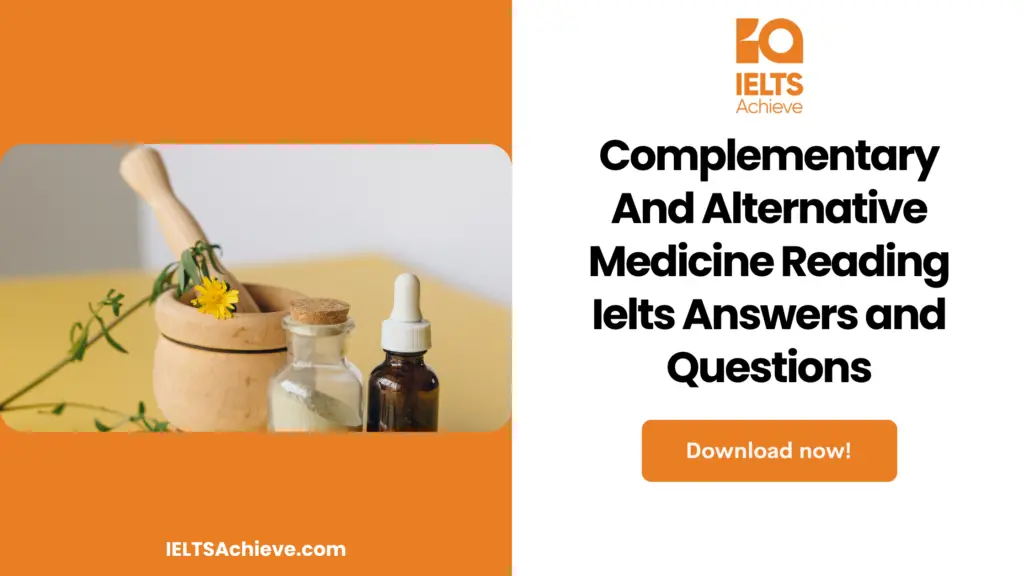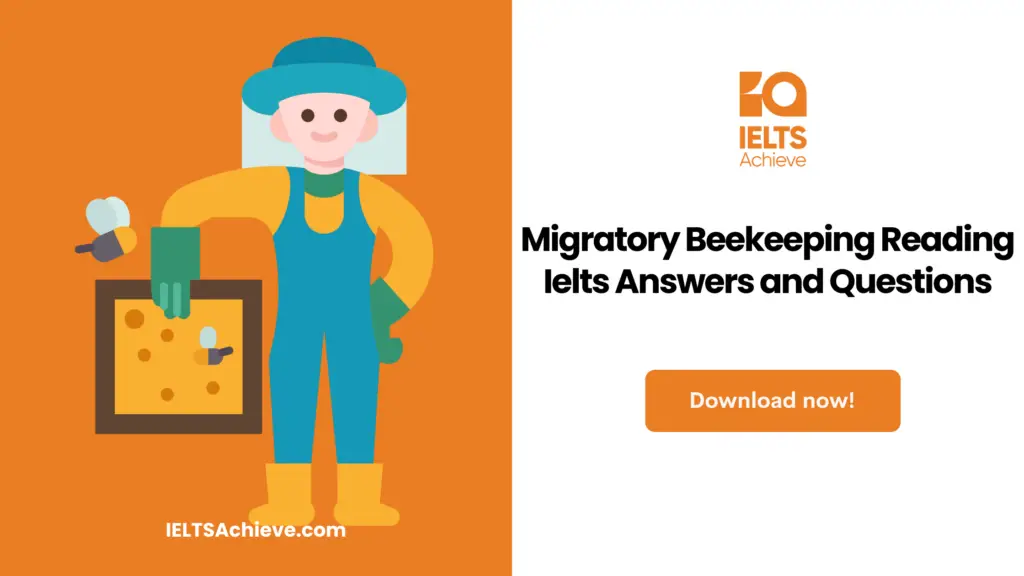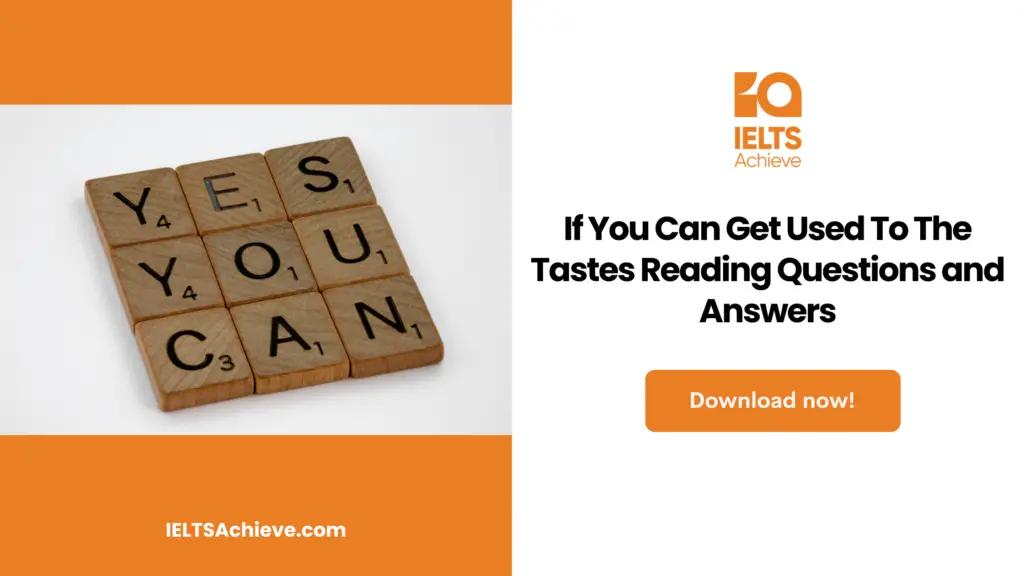The Blog post contains the following IELTS Reading Questions
- IELTS Reading Matching Features Questions.
- IELTS Reading Matching Sentence Endings Questions.
- IELTS Reading Short Answer Questions.
Stay informed and prepared for success – Explore our comprehensive Reading Test Info page to get valuable insights, exam format details, and expert tips for mastering the IELTS Reading section.
IELTS Reading Passage – Complementary and alternative medicine reading

Complementary And Alternative Medicine
WHAT DO SCIENTISTS IN BRITAIN THINK ABOUT ALTERNATIVE’ THERAPIES? OR LA KENNEDY READS A SURPRISING SURVEY.
Does supplementary medicine need extensive scientific study, or is it just hocus pocus? Should science look beyond traditional medicine to investigate emerging linkages between the brain and body? This will be a hot topic of discussion at the British Association for the Advancement of Science.
According to the most recent Mintel survey, one in ten Britons uses herbalism or homeopathy. Every year, people in Britain spend about £130 million on oils, potions, and pills, and the complementary and alternative medicine industry is estimated to be worth £1.6 billion. We asked scientists about complementary and alternative medicine with the help of Professor Edzard Ernst, Laing chair of complementary medicine at The Peninsula Medical School, Universities of Exeter and Plymouth. Seventy-five scientists from fields like molecular biology and neuroscience answered.
Unexpectedly, almost four out of ten scientists in our sample reported using alternative medicine, compared to two out of ten in the general population. There was a consensus among scientists who used them that they were useful: 80% thought so, and 20% didn’t. More than half of the scientists surveyed said that the National Health Service should cover complementary and alternative medicine including acupuncture, chiropractic care, and osteopathy since these practices were more beneficial than a placebo.
When it comes to C.A.M., scientists appear to put more faith in well-established fields like acupuncture, chiropractic, and osteopathy, where there are professional bodies and recognized training, as opposed to more fringe practices like aromatherapy and spiritual healing. According to one neuroscientist who has benefitted from osteopathic treatment, “Osteopathy is now a recognized profession needing a certified four-year degree before you can advertise and practise.” Almost two-thirds of the scientists who responded to our study thought that aromatherapy and homeopathy were no better than placebos, and almost half thought the same about herbalism and spiritual thinking. One in ten of our respondents had tried homeopathy, but some of the feedback we got was harsh. One University of Bristol molecular biologist argued, “Aromatherapy and homeopathy are biologically absurd.” Dr. Romke Bron, a molecular biologist at King’s College London’s Medical Research Council Centre, chimed in, “Homoeopathy is a gigantic swindle and I am confident that if someone snuck into a homeopathic pharmacy and swapped labels, nobody would notice anything.”
Even though homeopathy has been around for 200 years, there is still no solid proof that it works. Scientists are glad that the solutions and sugar they came up with are so good that they can do anything.
Followers of the “integrated health approach,” who want to treat a person “as a whole,” say that both complementary and conventional medicine should be used in everyday health care. But the scientists who answered our survey were very worried about this approach. More than half of them thought that integrated medicine was a way to avoid rigorous scientific testing. Dr. Bron said, “There is a lot of bad science in alternative medicine, and it’s hard for the average person to tell the difference between scientific myth and fact.” Maintaining strict quality control in health care is an absolute must. Even though most people who work in alternative health care are honest, there are too many scammers out there who take advantage of people who are weak.
A University of Warwick molecular biologist said, “By taking this poll, I have realized how pathetically little I understand about alternative therapy.” It is clear that more research is needed. Evidence from anecdotes suggests that some alternative therapies do help some people, thus this is a promising field for study.
In response to a question about whether or not C.A.M. research funding should be increased, scientists agreed that it should be increased for the top three CAM practices (acupuncture, chiropractic, and osteopathy) and herbalism. Physical manipulation and therapies with proven actions, such as the effect of a herb’s active components on a specific receptor in the body, appear to have the support of the scientific community. Less than a quarter of respondents agreed that alternative treatments including aromatherapy, homeopathy, and spiritual healing should get government funding.
Experts thought that complementary medicine was effective not because of its medical properties but because of the ‘feelgood’ counselling effect it had on patients and the time taken to listen to their difficulties. However, according to the British Medical Association, a typical doctor’s appointment lasts just eight minutes. UCL molecular scientist Dr. Stephen Nurrish remarked, “Much of the benefits individuals get from complementary therapy is the opportunity to talk to someone and be listened to sympathetically, something that is now lacking from medicine in general.”
This benefit was criticized, however, by an anonymous neuroscientist from King’s College London, who said, “On the validity of complementary and alternative medicines, no one would dispute that feeling good is good for your health, but why discriminate between museum-trip therapy, patting-a-dog therapy, and aromatherapy?” Is it because there is a community of trained “practitioners” exclusively in the latter but not the former?
But there are also staunch scientists who insist there’s no place in healthcare for modalities like acupuncture or homeopathy. “Either a treatment works or it doesn’t,” said Professor David Moore, director of the Institute for Hearing Research at the Medical Research Council. Testing it against suitable controls (i.e., scientifically) is the only method to determine its efficacy.
Unlock your full potential in the IELTS Reading section – Visit our IELTS Reading Practice Question Answer page now!
Recommended Questions:
Renewable Energy IELTS Reading Question with Answer
Complementary And Alternative Medicine Reading Questions
Questions 1-6
Look at the following views (1 – 6) and the list of people below them. Match each view with the person expressing it in the passage. Write the correct letter A- E in boxes 1-6 on your answer sheet. (NB. You may use any letter more than once.)
- Certain kinds of complementary and alternative medicine are taken seriously because of the number of people making money from them.
- It is hard for people to know whether they are being told the truth or not.
- Nothing can be considered a form of medicine unless it has been proved effective.
- It seems likely that some forms of alternative medicine do work.
- One particular kind of alternative medicine is a deliberate attempt to cheat the public.
- Complementary medicine provides something that conventional medicine no longer does.
List of People
A) Dr Romke Bron.
B) A molecular biologist from the University of Warwick.
C) Dr Stephen Nurrish.
D) A neuroscientist at King’s College London E Professor David Moore.
E) Professor David Moore.
Improve your performance in Matching Features questions by clicking here to access our comprehensive guide. Learn how to match specific features or characteristics with the options provided in the IELTS Reading section.
Questions 7-9
Complete each sentence with the correct ending A-F from the box below. Write the correct letter A-F in boxes 7-9 on your answer sheet.
7) The survey in which the writer of the article was involved gave information on __________.
8) The British Association for the Advancement of Science will be discussing the issue of ______________.
9) A recent survey conducted by a certain organization addressed the issue of ____________.
A. what makes people use complementary rather than conventional medicine.
B. how many scientists themselves use complementary and alternative medicine.
C. whether alternative medicine should be investigated scientifically.
D. research into the use of complementary and conventional medicine together.
E. how many people use various kinds of complementary medicine.
F. the extent to which attitudes to alternative medicine are changing.
Ready to sharpen your skills in Matching Sentence Endings? Click here to discover expert strategies and techniques for accurately matching sentence endings with the corresponding information in the IELTS Reading section.
Questions 10-13
Classify the following information as being given about
A) Acupuncture
B) Aromatherapy
C) Herbalism
D) Homeopathy
Write the correct letter, A, B, C or D in boxes 10-13 on your answer sheet.
10. A number of scientists had used it, but harsh criticism was expressed about it.
11. Scientists felt that it could be added to the group of therapies that deserved to be provided with resources for further investigation.
12. Scientists believe that it is ineffective but harmless.
13. Scientists felt that it deserved to be taken seriously because of the organized way in which it has developed.
Unlock your full potential in the IELTS Reading section – Visit our IELTS Reading Practice Question Answer page now!
Recommended Questions:
Renewable Energy IELTS Reading Question with Answer
Complementary And Alternative Medicine Answers
1. D
2. A (h6)
3. E
4. B
5. A
6. C
7. B
8. C
9. E
10. D
11. C
12. D
13. A

We hope you found this post useful in helping you to study for the IELTS Test. If you have any questions please let us know in the comments below or on the Facebook page.
The best way to keep up to date with posts like this is to like us on Facebook, then follow us on Instagram and Pinterest. If you need help preparing for the IELTS Test, join the IELTS Achieve Academy and see how we can assist you to achieve your desired band score. We offer an essay correction service, mock exams and online courses.

